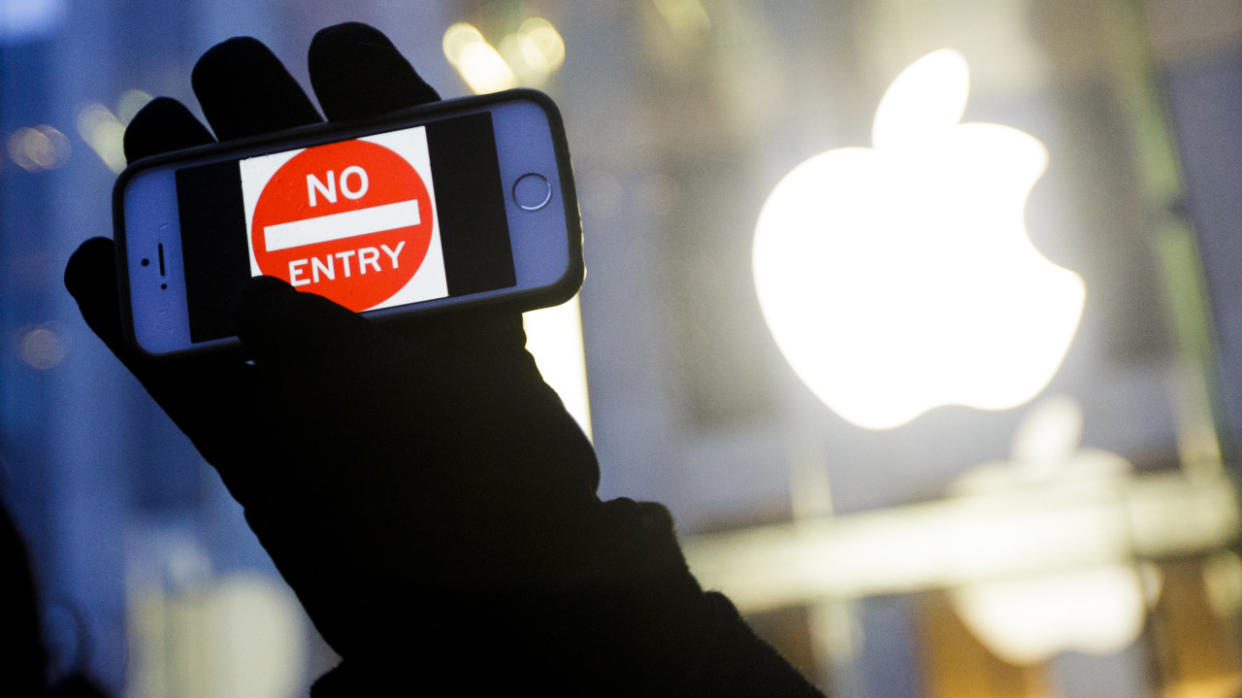Apple responds to FBI, files motion challenging iPhone order

An advocate for privacy holds up his iPhone at a rally in New York City. (Photo: Justin Lane/EPA)
Apple filed a motion Thursday afternoon seeking to overturn a court order that would require it to help the FBI unlock the iPhone of a San Bernardino shooter, another shot in the battle between the world’s most influential tech company and the U.S. government.
The 65-page brief argues that the FBI’s request would set a precedent that opens the “floodgates” to a series of similar law enforcement requests, ultimately compromising the privacy features of Apple’s devices.
“The government says: ‘Just this once’ and ‘Just this phone,’” the brief reads. “But the government knows those statements are not true … If this order is permitted to stand, it will only be a matter of days before some other prosecutor, in some other important case, before some other judge, seeks a similar order using this case as precedent.”
Central to the Cupertino-based company’s legal arguments is the claim that the company’s code counts as protected speech under the First Amendment.
“The government asks this Court to command Apple to write software that will neutralize safety features that Apple has built into the iPhone in response to consumer privacy concerns…” the brief reads. “This amounts to compelled speech and viewpoint discrimination in violation of the First Amendment.”
Slideshow: iPhone security protests >>>
Apple’s lawyers also expressed concern that the FBI’s request would “coercively deputize Apple and other companies to serve as a permanent arm of the government’s forensics lab.” The tech giant claims that creating and storing a mobile operating system that aids the FBI in unlocking its devices would require an excessive investment of staff, resources and time. For instance, the motion said that it would take Apple as long as four weeks to build the software the FBI needs to break into the San Bernardino shooter’s iPhone.
“Here the government wants to compel Apple to deploy a team of engineers to write and test software code and create a new operating system that undermines the security measures it has worked so hard to establish — and then to potentially do that over and over again as other federal, state, local and foreign prosecutors make demands for the same thing,” the motion reads.
In the brief’s conclusion, Apple argued that the decision to help the FBI break into the iPhone in question should not be decided in the courts, but by Congress — a sentiment echoed by CEO Tim Cook during an ABC interview Wednesday night.
“While the government’s desire to maximize security is laudable, the decision of how to do so while also protecting other vital interests, such as personal safety and privacy, is for American citizens to make through the democratic process,” it read.
According to multiple news outlets, Facebook, Google, Microsoft and Amazon plan to file amicus briefs in support of Apple. A public hearing between Apple and the FBI is scheduled for March 22.
Read the full motion below:
Motion to Vacate Brief and Supporting Declarations

